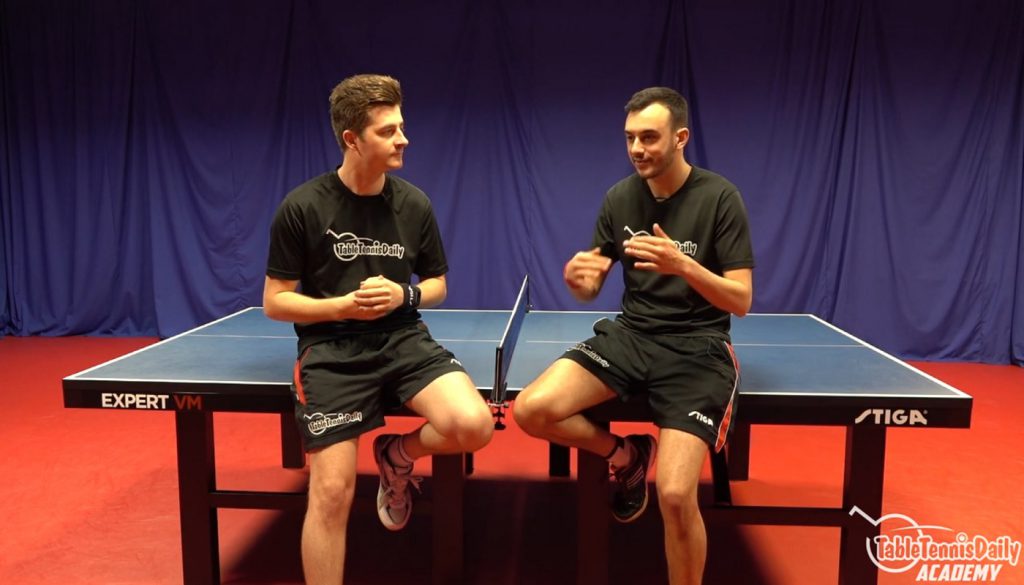Most table tennis players are all too familiar with the difficulty of the mental side of competitions and match play, using the power of the mind is crucial to improve at all ages and levels. Mental toughness is often what separates players of a similar ability and technical level or in tight and tense situations. For this reason, sport psychologists are used readily by top table tennis players along with other racket sports as the impact on a player’s game can be huge, some players spend several hours each week doing mental training exercises. Now we know that most people don’t have the time to spend hours on this aspect of the game or access to a sports psychologist so here at TableTennisDaily Academy we’ve made things simple for you and put together these quick but very worthwhile mental toughness tips that will improve your approach to match play and competitions!

1) Self-talk
A brilliant calming tool is self-talk which is most easily done by using simple phrases such as, “only the ball.” Whether you’re upset, frustrated, nervous, or just distracted, repeat this phrase to block out negative thoughts and pull your focus back to where it needs to be. This will centre in your attention to what you need to affect and control, the ball, rather than external feelings or distractions. Focusing on your performance over the outcome/result will allow you to control the controllable.
2) Focus when returning
One of the hardest time to concentrate in table tennis is when you are about to return serve. As your opponent has the ball your focus can easily drift as your mind can sense this is an opportunity for a mental break. Of course, this can be fatal as if the mind switches off or you lose focus for a second the serve is coming at you and you have very little time to process an effective return. To maintain a good concentration and focus at this time try these tips:
•Focus on something simple and un-distracting while your opponent is preparing to serve, like the white tape on the net, this will stop you getting distracted by your surroundings and other factors.
•Take a deep breath out before they serve and then watch the ball leave your opponent’s hand.
•Stick to a routine when returning just like you should when serving, if you do this consistently your mind is used to this and get’s tuned in to focus and be ready.
3) Don’t over think
It’s easy to over analyse during a match which can stop you from playing your shot’s in a natural way, at the same time it’s important to not lose focus on being analytical in certain areas of the game or at certain times. When you make an unforced error or mistake, it will be easier to not dwell on it too long if you get to the root of why you missed. It could be timing, a technical mistake or simply rushing your stroke but if you isolate what happened and tell yourself “Next time I won’t do that.” It allows you to move forward positively. It’s possible you will repeat the mistake but by repeating this process eventually you will correct yourself and bring an optimistic attitude to your game.
4) Be versatile
If you have a very fixed style of play and it’s not working in a particular match you may feel as though you’ve run out of options or ways to change the game. However, if you can be versatile enough to adapt your game or change tactics efficiently this will give you the positive belief that you can choose a different course of action. If your versatile and your “Plan A” isn’t working, you’ll be able to deal with this much more easily if you have other options or strategies to fall back on. As long as there are other things to try you’ll find yourself never giving up until every possibility has been exhausted, this will make you tough to beat and can often help find weak areas of your opponent.
5) Good body language
Your body language and demeanor on the court can have a big impact on your mental toughness. If you show your opponent your frustrations or poor body language they will immediately know you aren’t feeling your best and will have the psychological upper hand. However, if you can come across as confident, full of energy and as if your enjoying yourself (Even when perhaps you aren’t) it will come out in your game play. By doing this it can discourage your opponent to a significant extent and your look of confidence even in difficult situations or when behind in the match is a great way of maintaining a forward looking and positive attitude.
For a more in-depth analysis and greater tips on the psychological side of the game check out our new videos on the TableTennisDaily Academy.
